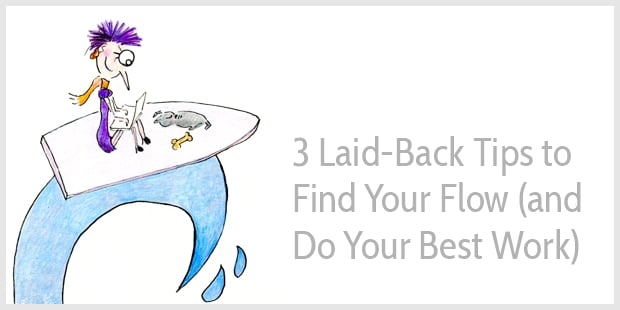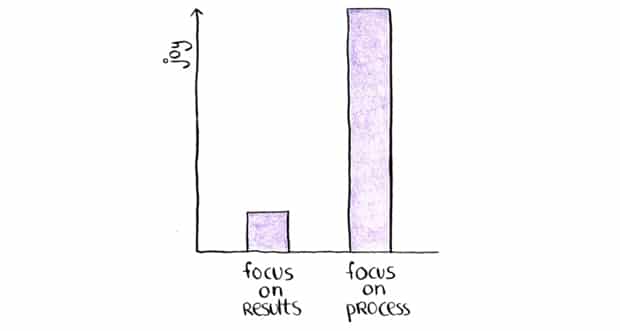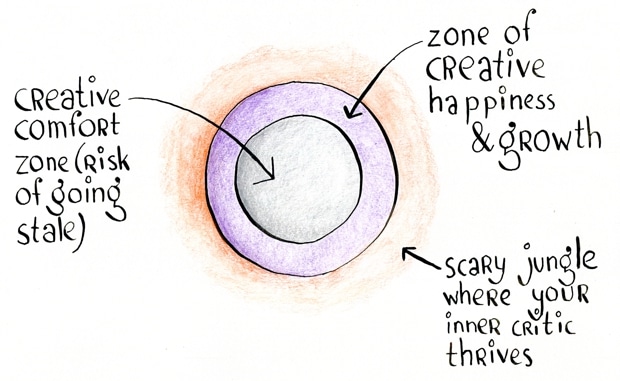 Henrietta reads her blog post once more.
Henrietta reads her blog post once more.
She changes a word here and there.
Corrects a typo.
And then strengthens her final two sentences.
It’s done.
And it feels good.
Oh, she thinks, if only writing could always be this way.
The feeling of being fully present and at ease in her skin. The quietness. The focus. The flow.
How come her inner critic falls asleep when she’s so focused?
And how can she get in a flow more often?
1. Find detachment and focus
Last year, I came across one of the best descriptions of flow I’ve ever read.
In her book Saltwater in the Blood, Easkey Britton, a big wave surfer, writes:
Those moments when we are most deeply immersed in our environments, through an embodied experience, are known as the “flow state”: the ability to hold two opposing views, that is to be detached from the outcome yet still single-mindedly focused on what needs to be done.
Detachment and focus.
Yes, I thought. That’s it. When I’m writing and get in a flow:
- I stop doubting my work. I stop worrying how readers might react. I don’t think about shares and comments or ranking in Google. That’s detachment.
- I focus on doing my best work, improving a draft step by step. I do think about you (that’s you, dear reader) and how my words may come across but only because I want to make this better. I’m intensely focused on the task in front of me.
Britton notes that getting in a flow creates a sense of belonging—she’s no longer questioning her place.
I recognize that.
When I’m in a flow, I feel an ease of being. I’m not fighting the words; I’m at one with the words. I’m patient, and I feel connected to myself, to you, to the world, to whatever idea I’m working on.
There is a quietude. My inner critic is at her best behavior, supporting me. It makes my work better, and writing becomes a joy.

2. Forget the competition
Being in a flow requires us to be focused on our own work.
Just do the best work you can.
As soon as we start worrying about measuring up, we lose our focus. In big wave surfing, such external pressures are lower. Here’s Britton again:
What drew me to big waves was the unboundedness of it all. Unlike competitive surfing, where the pressures were external, with big wave surfing the pressures were all internal. In a strange way, this felt kind of liberating – to have my ego exposed to the elements, my only judge being the wave I chose to ride. It felt as if I was conforming to nothing but the laws of physics, and experiencing the rawness of my being.
Especially when writing online—for social media, a blog, or a newsletter—the pressures can feel high. We all like to get a positive reaction. More opens, clicks, likes, shares, comments. It’s the exact opposite from big wave surfing.
After an absence of almost 5 years, I’ve recently started posting again on LinkedIn. (Shall we connect?) The marketer in me feels the need to make the work pay off. Is it worth investing time in social media? Will it gain me more email subscribers? And, of course, my ego is watching the number of impressions, likes, and comments for each post.
I try to acknowledge those pressures. I let the marketer in me set some boundaries, like deciding how often I’ll post and what topics I want to post about. Then I try to let go and give my inner artist the freedom to play and create.
There is an inner artist in all of us. When we let go of pressures and let our inner artists play, we can do our best work.
3. Lean into the fear
As writers, we’re fortunate. We’re not at risk of drowning.
Yet, interestingly, Britton considers the fears of not measuring up as bigger than the physical risks of big wave surfing:
For me, fear comes from the mind, not the heart. Fear is a call or a cry to listen to ourselves, to be here now. Fear is a great teacher; it’s taught me to be humble, to have trust in myself and a power far greater than me. I think big wave surfing more than most experiences really confronts me with my sense of identity – who I am, at least for those moments when I’m in the water. The greatest fear I faced out there, I’ve come to realize, was not the size of the waves but this feeling that I had to somehow measure up to the expectations of others, and the expectations I placed on myself as a result.
That fear of not being good enough, of being a disappointment, that’s what we face as writers, too.
And the antidote?
Lean into the fear.
Fears often gain in power when we try to fight or ignore them. But when we acknowledge our fears, they become more manageable.
Here’s what Britton writes:
That curiosity and desire to embrace the unknown, to go to the edge and lean into fear, is a powerful and important value of surfing. It’s the kind of fear that embraces vulnerability, the art of letting go. It’s about risk-taking, and being really honest with ourselves.
It’s the same with writing. I try to dance with my fears, and I can do that best when I tiptoe out of my comfort zone.
When I stay in my comfort zone, I go stale. When I venture too far outside, fear can become paralyzing. So, I dance in that zone in between. Enough challenge but not too much.
As Britton suggests, the sense of flow is “found at the edge of what’s familiar and what’s unknown.”

Trust yourself
When I started writing, it felt like I was wrestling with words and fighting with my inner critic all the time. I worried how a piece would turn out and what people’s reaction would be.
Over time, I learned that I can only try to do my best.
So, that’s what I do …
I focus on the task at hand whether that’s writing a crappy first draft, revising, or proofreading. I try to trust the writing process; somehow a crappy draft will turn into a finished piece, ready for publication.
I’ve mostly stopped questioning whether I’m good enough. I’ve stopped fighting my inner critic, and she’s become more supportive.
Yes, the marketer in me sets some of the rules. But mostly, I let my creative soul unfurl its wings.
It still feels like magic.
A sense of surprise that I’ve written this.
Thank you, my friend, for being here.
Recommended reading on finding your writing flow
How I made peace with my inner critic
3 writing strategies to put your words onto paper
How to get into your writing zone


What a way to start a day. Reading your post felt like you read my mind and wrote what was playing there.
Yes, I too get paralyzed, and frustrated sometimes when I sit down to write. It is a numbing experience, but then I gently start pushing myself from the comfort zone into the ‘has to be done’ zone.
It works, slowly pushing away thoughts of how many comments, likes or shares will I get like a ice breaker cutting through ice.
I let myself go like a base jumper who perhaps pauses at first, momentarily paralyzed at the sight of the depth below – but finally lets himself go, knowing he can do it and will do it.
Thank you so much for such a lovely and well timed post.
P.S. I have sent you a connection request on LinkedIn but since I have run out of the free message options, I couldn’t send you a personal message with it.
I would love it if you accept my request.
It would be from Subhankar Bhaduri.
Sounds like you exactly know how to get into your writing mode. Happy writing, Subhankar.
Flow…that somewhat magical place. Detachment and focus, I got a lot of work there.
Thank you Henneke, for this piece. As usual, it’s enlightening.
Thank you, Ruth. I’ve found that the idea of both detachment and focus provides a really useful perspective. It does seem to require continuous work!
Perfect, Henneke. Just what I needed. When age comes into the equation and I fret that I don’t have it anymore, I’ll stop worrying about what others think and “only try to do my best.” Thank you.
You know, Nomi, I also fret about not having it anymore. For me, it’s less an age thing. More a sense of losing my knack after having written my blog for so many years. Oh, maybe it’s an age thing. I don’t know. But whatever it is, we can only keep doing our best. I appreciate your stopping by. Thank you.
This is a “pin it on the wall” post, Henneke! And not only for writing, substitute “creating” whatever the function being worked at. Marvelous.
What a lovely compliment. Thank you, Bob. I’ve also found that when I learn how to solve a writing challenge, I can apply the same learning to much else in life, too.
Keep dancing. You do it so well.
Thank you, Dennis. I enjoy the dance.
Hi Henneke,
Big wave surfing vs a half gainer into the melieu of social media. Mmmmm. As comedian Lewis Gizzard was fond of saying before “flow” was elevated to the status of Flow. “If you can’t flow flee.” (Carry, if not a sword at least a shield. You will be fine. Grace and peace.)
Good suggestion. I’ll carry a shield and perhaps my pen, I think, rather than a sword.
And maybe I should have mentioned that I admire the bravery of big wave surfers. I was surprised to read that she considers the threats to her ego bigger than the threats of drowning. I don’t think, I’d be courageous enough for big wave surfing. It looks impressive but scary, too.
Great advice! In times of distraction and overexposure to social media (and the pressure it comes with) this is the reminder we all need – thanks for sharing Henneke!
I think I needed the reminder myself, too. Getting back into social media is challenging! Sending love ❤️
Thanks, Henneke, for all your insightful and helpful posts about writing. I’ve written on the subject as well. In my poem “A Letter to Myself, or Why I Write,” I say that my real motivation is the joy of writing when it flows and not the external validation of getting published in prestigious magazines or winning awards.
Yes, yes, to focusing on the joy of writing.
I loved it Henneke! Really, really good! I try to stay in the flow thinking that nothing that I write is ever going to be perfect and writing more often is what’s going to help me get better. I read somewhere (I think it was Phoebe Weller-Bridge) “The pain of not writing is greater than the pain of writing” This resonate so much with me. Big hug!
I like that: “The pain of not writing is greater than the pain of writing.” For me, writing is really essential to being me, to being alive. If I can’t write, I feel lost.
And please, do keep writing. I know it gives you joy, too. Big hug back to you!
As always, it’s a pleasure reading you. I feel the person and I read the wise and powerful message. Thank you Henneke for sharing with us your art, your time and your heart.
Thank you, Claudia. What a lovely comment. And yes, this was written from my heart.
Flow!! That elusive piece of a writers mind we all cherish, yet so often struggle to find.
A very enjoyable read Henneke. Thank you.
Yes, I hear you. There are so many things that can stop us from getting in a flow. And then when we get in a flow, it seems so effortless.
Thank you, Henneke. I needed to read this today.
Glad it came at the right time! Happy writing, Rachel.